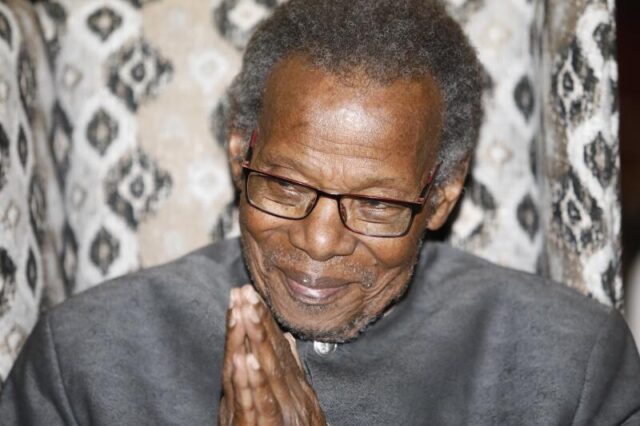OPINION: Mangosuthu Buthelezi leaves a legacy that historians and commentators will contest in the years ahead, as they did in the more than five decades of his political stamp on us, writes Professor Saths Cooper.
ONE OF the most controversial figures in the turbulent history of South Africa died on Saturday, September 9, the 150th anniversary of the death on Robben Island of Chief Maqoma who resisted British colonialism.
On the occasion of his 95th birthday on August 27, I related my personal engagements with Prince Mangosuthu Gatsha Buthelezi (Shenge), who was considerate, readily smiled and showed grace. Much is already being churned out about his contributions to the largest ethnic group in South Africa, the province of KwaZulu-Natal, and our country. This obituary will avoid traversing what is indisputable about his life and roles, raising a few issues that ignited his ire, and showed his multifaceted personality.
The redoubtable Shenge, appointed uNdunankulu kaZulu by King Cyprian Bhekuzulu in 1954, persisted in retaining the position, influencing commoners and royalty with his singular narrative. Shenge leaves a legacy that historians and commentators will contest in the years ahead as they did in the more than five decades of his visible political stamp on us. From uncritical praise or castigation, with a healthy dose of fear thrown in – the University of Zululand and the Mangosuthu University of Technology were forced to be kept out of the fraught university mergers that began 20 years ago – the lurking shadow of the terrible violence unleashed in KZN, Gauteng and elsewhere from the early 1980s, his withdrawal from and last-minute participation in the 1994 democratic elections, comprise the weave of his public fabric. Disavowing any public advocacy of violence, forcing the TRC to redact its original report, the scars and threats of unleashing fury will unfortunately remain an indelible blot on thousands who were on the receiving end of apartheid-sponsored violence.
His testy, often dismissive and defensive, relationship with the liberation struggle, and especially the ANC, was rendered more complex by his personal relationships with its pre-eminent leaders, Inkosi Albert Luthuli, OR Tambo, Nelson Mandela, Thabo Mbeki and Jacob Zuma. When his testimony in Dorothy Nomzansi Nyembe’s terrorism trial was raised, he blamed the then banned ANC operatives for putting him at risk. Nyembe nevertheless was sentenced in January 1969 to 15 years in apartheid jails.
His fierce defence of having no option but to assume leadership of the Zululand Territorial Authority in 1970, the creation of the Inkatha Cultural Liberation Movement in 1975 – fashioned after his uncle King Solomon kaDinizulu’s Inkatha Yenkululeko Yesizwe, which ultimately became the IFP that he controlled with an iron fist – and his much-vaunted refusal to accept independence for the KwaZulu Legislative Assembly, his opposition to sanctions against the vicious apartheid regime, with the refrain of sanctions hurting blacks more than whites, yet claiming the approval of the ANC in exile, all contribute to the multi-textured complexity of this personality who has dominated KZN political and cultural life. If he wasn’t able to silence you with his daunting visage that easily broke into a wide smile, he could hold you for over a fortnight with his meandering address; one that clearly broke Fidel Castro’s renowned record for lengthy speeches.
On March 11, 1978, when the stance of non-collaboration with apartheid structures and the bantustans was at its height, Labour Party leaders and Shenge were prevailed upon by Archbishop Desmond Tutu to leave Robert Mangaliso Sobukwe’s funeral in Graaff-Reinet, with his bodyguards firing two shots into the air. The Anglican Church was constrained over the years to remain aloof from the Archbishop and the SA Council of Churches. A devout Anglican, he did not pursue the choice of taking any wives besides his beloved Irene Audrey Thandekile, to whom he was married for some 67 years. He kept his family life private, yet went public in 2004 that his son and daughter succumbed to HIV/AIDS.
Many were terrified of his tongue-lashing and being sued by him, although –uniquely – he was sued by Mbeki during his tenure as Home Affairs Minister over immigration policy. Shenge had previously demanded that if he were to become deputy president, he retain the title and privileges that Mbeki enjoyed when he styled himself Executive Deputy President. This paved the way for the KZN MEC for Economic Affairs, Jacob Zuma, being appointed, and the rest is history. He probably was the longest-serving member of a democratic Parliament.
Ultimately, a distinct figure who was a product of and shaper of our muddled thinking on how to extricate ourselves from the yoke of racist oppression and economic exploitation, as we contemplate the end of an era that still haunts us in the present, with little clarity of what the future holds. Hamba Kahle, Shenge, uphumule ngokuthula. You will be remembered for being many things to so many people!
* Professor Saths Cooper is president of the Pan African Psychology Union, a former political prisoner and leader of the Black Consciousness Movement and a member of the 1970s group of activists.
** The views expressed do not necessarily reflect the views of the DFA.








